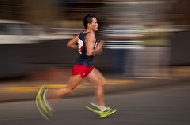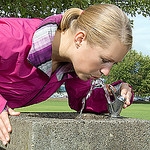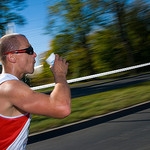Footstrike Patterns and Running Injury Rates
Posted by Rich Souza PT, PhD on April 8, 2013

The Starting Line: Does foot strike pattern affect injury predisposition? A recent study by Daoud and colleagues at Harvard University set out to determine the difference between rearfoot strike and forefoot strike on types and rates of injuries among runners. The study population consisted of 52 male and female, high-level intercollegiate track and cross-country runners, competing in distances ranging ...
Calcium Affects More Than Just Bones
Posted by Andrea Hacker MS, RD on March 18, 2013

The Starting Line: Is calcium good for your bones, but bad for your heart? Calcium is the most abundant mineral in our bodies, and it is 99% stored in our bones. When we do not get enough calcium through diet, the body will take it from our bones to maintain necessary blood calcium levels. Over time, this loss of calcium from the bones can result in low bone density. Peak bone mass is reached by 30 year...
Staying Hydrated during Exercise
Posted by Janine Wong MS, RD on February 18, 2013

Part 3 of a 3 part hydration series The Starting Line: What is the best way to stay hydrated during exercise? Staying hydrated during exercise is important for physiological safety and for performance. Once you’ve assessed your individual fluid needs, the next step is to develop your hydration plan. Before Exercise: Ideally, when starting an exercise session, you should be in a state of norma...
Over Hydration and Hyponatremia
Posted by Janine Wong MS, RD on February 11, 2013

Part 2 of a 3 part hydration series The Starting Line: How can I prevent exercise associated hyponatremia? Exercise associated hyponatremia was first documented in the 80’s by Noakes and colleagues, and was called “water intoxication”. Hyponatremia means low (hypo) sodium (natre) in the blood (mia). Specifically a blood sodium concentration below 135 mEq/L defines hyponatremia...
Assessing your hydration needs
Posted by Janine Wong MS, RD on February 4, 2013

Part 1 of a 3 part hydration series The Starting Line: How can I tell if I am dehydrated? It is an undisputed fact that hydration is important in daily activities, and especially in exercise. Dehydration resulting in a 2% change in body weight has been demonstrated to impact aerobic performance. Physiological consequences include increased strain on the body during exercise, increased heart rate and ...

